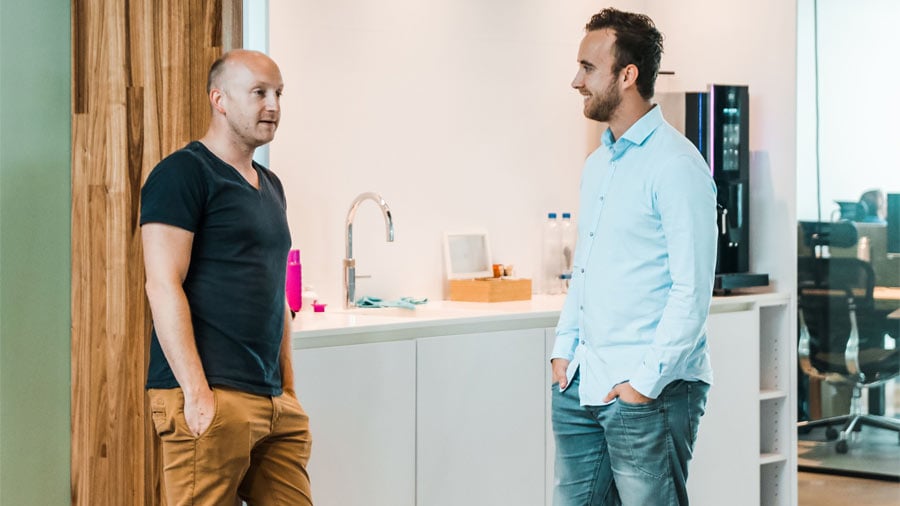Coming up with something new and original is no easy feat in today’s connected world. Everywhere you look throughout your research will likely lead you directly to a website, service, or article which does (or says) everything you had envisioned. Maybe it’s your own mind which gets in your way, analyzing the minor details to the point of paralysis.
Even for seasoned creatives and innovators, creative and innovation blocks are tough hurdles to surmount. How you go about injecting yourself into a topic or niche is a process which takes time to master but there are a couple of tricks and small changes which can help get through the barriers.

Back to Basics
I really want to start out with the simple concepts which are easy to adopt into your lifestyle or daily routine. Why? From personal experience and working around some amazing innovators, the simple things are usually what gets the creative juices flowing fastest.
- Stretch your legs: Nobody ever said that your greatest ideas had to come while behind a desk. I’m not saying you should abandon your 9-5 and go for a long walk on the beach but find a quiet place to unplug for a few minutes.
- Finish a smaller task: Even the greatest minds need a confidence boost from time-to-time. So if you’re not making much progress on a project, change your focus to something smaller and smash it out the park. Plus that little task won’t be at the back of your mind all day (it’s a win-win!).
- Put everything on paper: Yes, absolutely everything that comes to mind. Often times when we avoid certain topics or ideas it’s because we don’t think they’ll connect with our intended end-results. However, when everything’s on paper you may find that they’re not as off-center as we thought.
- Get visual with ideas: Sometimes ideas don’t come in the form we expect. Our inner voice can also express itself in a more visual way, so why not put those out there as well? Mind maps, flow charts or even just plain drawings can get thoughts out of your head and flowing out in the world where they need to be. Massive plus-point? Re-living your school days which is satisfying, to say the least.
Test out innovation labs
If you’ve been keeping up with the latest business trends then you’ll definitely have come across innovation labs at some point. If you haven’t, the very basic concept is to create a space where people can freely ideate without boundaries. In essence, the team sets a goal and map out the best possible solution by looking at the biggest, baddest or even weirdest ideas. Traditionally these labs are associated with IT departments to help them generate new ideas which work extremely well for companies like Univé and Foryard. However, I think they have a place in any creative process.
Why? Because (ideally) you’re collaborating with a diverse group of people, each with a unique skill set and approach to problem-solving. Generally, we see these labs set up across a whole organization but there’s nothing stopping you from starting the process in your own team.
Listening to experts who have successfully implemented innovation labs shows a couple of side benefits outside of the ideation process as well.
Get outside your own head
Critics come in all shapes and sizes but without a doubt, nobody has a stronger opinion of your work than yourself. Not that it’s a bad thing in any way, being able to assess the quality of your own work is an important skill for self-improvement. Here’s the problem… we’re human beings and our brains are fickle little things at the best of times. Under stress or pressure to perform is when our inner critic goes into overdrive, overthinking every phase, line of code or idea to the point where nothing could be good enough to satisfy ourselves.

It’s a scary moment which has the potential to stall a creative process completely (piling on even more pressure as it goes on). Since it’s your own thoughts creating this block, getting around it will take some outside influence.
Get out there, reach out to topic experts or find people who may have different questions and angles to your own. It shouldn’t be a one-way conversation either, bouncing your own thoughts to those around you almost always leads to surprising results. Perhaps a colleague sparks your creative process again with a fresh angle or simply validates the core idea of your project. What’s important here is that you are receptive to any feedback you get.
Treat yourself right
One of the most genuinely terrifying things faced by innovators is feeling creatively drained for a long period of time. Whether your a software developer, content writer or artist, your ideas are your way of keeping the lights on at home. Exactly how someone ends up in a long slump could have any number of root factors which can easily go unnoticed for months. In the UK alone a total of 70 million workdays are lost (each year) due to stress at work or through absence.
Getting back into the swing of things is different for everyone but even the little things can make a massive difference. Simple habits like ensuring you get enough sleep, eating healthier foods, and exercising have a significant impact on your stress levels. Find what works for you and stick with it.
Disclaimer: Take these thoughts ideas as a base, what’s best for you is not the same as another but taking care of yourself doesn’t have a downside. So do it.
Manage your workload
Don’t be a hero at the expense of your sanity. Everybody loves being a problem solver, the person who everyone can rely on to get things done. A noble pursuit on a surface level and not a negative character trait by any means (you’re a go-getter and we like that). Here’s the thing with overloading your plate: no matter how focused you are, at some point one of those other tasks will distract you from your priorities.

You may find yourself absent-mindedly thinking of another task or even lose interest in your main goal entirely in favor of something else. Your solution is pretty simple, understand the limits of your own focus when new work comes in. Like technology, your aim goal should be to work efficiently, quickly, and flexible which just isn't possible when you’re weighed down with a dozen small tasks (each with their own deadline).
As a small side note: Information overload can lead to a kind of ‘topic paralysis’ where you have so much to cover that you end up not knowing where to start. When planning out your steps, aim to be informed but don’t go trying to absorb the entirety of a subject or project overnight. Especially if you’re exploring something new.
What can you take away from this?
Well, the very basics of it all is don’t panic. Any hurdles you come across aren’t going to be permanent and there are hundreds of ways to get back into the flow of things. Change your environment, mindset, or lifestyle at your own pace but sitting still won’t get you anywhere.


